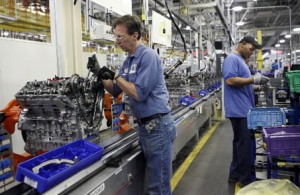 Before currency, people exchanged what they had for what they needed. Nowadays, cash is king. Specialization on a large scale is great for the economy. Specialization occurs because of advantages. An absolute advantage is an ability to produce a good or service with less inputs/costs than a competitor. Absolute advantages do not drive specialization though. Specialization is driven by comparative advantages. A comparative advantage is an ability to produce a good or service at a lower opportunity cost, or the value of the alternative given up.
Before currency, people exchanged what they had for what they needed. Nowadays, cash is king. Specialization on a large scale is great for the economy. Specialization occurs because of advantages. An absolute advantage is an ability to produce a good or service with less inputs/costs than a competitor. Absolute advantages do not drive specialization though. Specialization is driven by comparative advantages. A comparative advantage is an ability to produce a good or service at a lower opportunity cost, or the value of the alternative given up.
Why does the comparative advantage take priority over absolute advantage? Imagine Farmer A can grow 100 watermelons, 50 cantaloupes, or 50 watermelons and 25 cantaloupes each season. Farmer B can grow 60 watermelons, 40 cantaloupes, or 30 watermelons and 20 cantaloupes. Farmer A has an absolute advantage in watermelons and cantaloupes. However, to produce 50 cantaloupes, Farmer A is giving up 100 watermelons that he could have produced. These 100 watermelons are Farmer A’s opportunity cost. Farmer B has an opportunity cost of 60 watermelons. To have the highest level of production, Farmer A would produce 100 watermelons while Farmer B produces 40 cantaloupes. Each farmer produces the fruit that the farmer has the comparative advantage in.
America has the resources to produce the majority of what we view as the necessities of life. Depending on the product, the USA has the comparative advantage. Unfortunately, many businessmen would argue that the United States’ tax laws, wage laws, insurance laws, and every other type of law are not set up to promote business. America has slipped all the way to 14th in Forbes 2013 list of best countries for business. Many big businesses move overseas to take advantage of cheaper input costs. Although the USA still ranks in the top 15, many countries take advantage of lower employee costs in countries outside of the top 10 or 15.
So what does this matter to you? I once opened a fortune cookie to read, “An expert is someone who knows very much about very little.” The need to be an expert in your field has forced previously common knowledge to be in low demand. Each area of the economy has become so in-depth that people can only focus on one area. How many of us expect someone to be able to do their jobs, knowledgably, as well as do something as previously common as change their oil or sow a button? Individual specialization is opening our wallets by causing us to be more dependent on others. Specialization on a global, country, state, city, or company basis works; however, individual specialization is ineffective.
Who cares? This has a lot to do with the age-old argument of whether it is better to know a little about a lot or a lot about a little. There is economic value to the latter. The United States prides itself on knowledge as an absolute advantage in various businesses. It is one of the reasons America has thrived for so many years. However, citizens are limiting themselves. This article is not intended to make you change jobs, take up a new hobby, move to another country, or anything of the sort. It is intended to make you question your current way of life. Are you limiting yourself to only doing what is most financially profitable?
